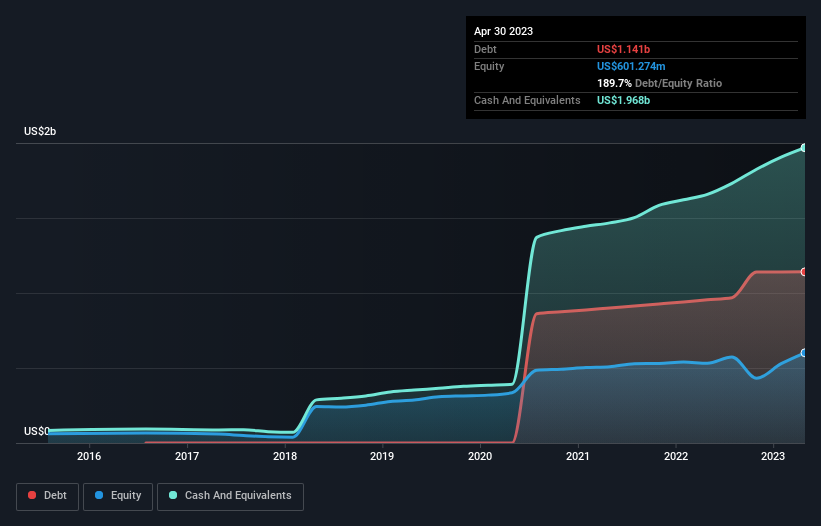
The external fund manager backed by Berkshire Hathaway's Charlie Munger, Li Lu, makes no bones about it when he says 'The biggest investment risk is not the volatility of prices, but whether you will suffer a permanent loss of capital.' When we think about how risky a company is, we always like to look at its use of debt, since debt overload can lead to ruin. We note that Zscaler, Inc. (NASDAQ:ZS) does have debt on its balance sheet. But is this debt a concern to shareholders?
When Is Debt Dangerous?
Debt is a tool to help businesses grow, but if a business is incapable of paying off its lenders, then it exists at their mercy. Part and parcel of capitalism is the process of 'creative destruction' where failed businesses are mercilessly liquidated by their bankers. However, a more usual (but still expensive) situation is where a company must dilute shareholders at a cheap share price simply to get debt under control. By replacing dilution, though, debt can be an extremely good tool for businesses that need capital to invest in growth at high rates of return. The first step when considering a company's debt levels is to consider its cash and debt together.
Check out our latest analysis for Zscaler
What Is Zscaler's Net Debt?
You can click the graphic below for the historical numbers, but it shows that as of April 2023 Zscaler had US$1.14b of debt, an increase on US$954.6m, over one year. But it also has US$1.97b in cash to offset that, meaning it has US$827.6m net cash.

A Look At Zscaler's Liabilities
The latest balance sheet data shows that Zscaler had liabilities of US$1.29b due within a year, and liabilities of US$1.31b falling due after that. Offsetting this, it had US$1.97b in cash and US$382.1m in receivables that were due within 12 months. So its liabilities total US$248.9m more than the combination of its cash and short-term receivables.
This state of affairs indicates that Zscaler's balance sheet looks quite solid, as its total liabilities are just about equal to its liquid assets. So while it's hard to imagine that the US$20.2b company is struggling for cash, we still think it's worth monitoring its balance sheet. Despite its noteworthy liabilities, Zscaler boasts net cash, so it's fair to say it does not have a heavy debt load! The balance sheet is clearly the area to focus on when you are analysing debt. But it is future earnings, more than anything, that will determine Zscaler's ability to maintain a healthy balance sheet going forward. So if you're focused on the future you can check out this free report showing analyst profit forecasts.
In the last year Zscaler wasn't profitable at an EBIT level, but managed to grow its revenue by 53%, to US$1.5b. Shareholders probably have their fingers crossed that it can grow its way to profits.
So How Risky Is Zscaler?
Although Zscaler had an earnings before interest and tax (EBIT) loss over the last twelve months, it generated positive free cash flow of US$307m. So although it is loss-making, it doesn't seem to have too much near-term balance sheet risk, keeping in mind the net cash. One positive is that Zscaler is growing revenue apace, which makes it easier to sell a growth story and raise capital if need be. But we still think it's somewhat risky. There's no doubt that we learn most about debt from the balance sheet. However, not all investment risk resides within the balance sheet - far from it. These risks can be hard to spot. Every company has them, and we've spotted 3 warning signs for Zscaler you should know about.
Of course, if you're the type of investor who prefers buying stocks without the burden of debt, then don't hesitate to discover our exclusive list of net cash growth stocks, today.
If you're looking to trade Zscaler, open an account with the lowest-cost platform trusted by professionals, Interactive Brokers.
With clients in over 200 countries and territories, and access to 160 markets, IBKR lets you trade stocks, options, futures, forex, bonds and funds from a single integrated account.
Enjoy no hidden fees, no account minimums, and FX conversion rates as low as 0.03%, far better than what most brokers offer.
Sponsored ContentValuation is complex, but we're here to simplify it.
Discover if Zscaler might be undervalued or overvalued with our detailed analysis, featuring fair value estimates, potential risks, dividends, insider trades, and its financial condition.
Access Free AnalysisHave feedback on this article? Concerned about the content? Get in touch with us directly. Alternatively, email editorial-team (at) simplywallst.com.
This article by Simply Wall St is general in nature. We provide commentary based on historical data and analyst forecasts only using an unbiased methodology and our articles are not intended to be financial advice. It does not constitute a recommendation to buy or sell any stock, and does not take account of your objectives, or your financial situation. We aim to bring you long-term focused analysis driven by fundamental data. Note that our analysis may not factor in the latest price-sensitive company announcements or qualitative material. Simply Wall St has no position in any stocks mentioned.
About NasdaqGS:ZS
High growth potential with excellent balance sheet.
Similar Companies
Market Insights
Community Narratives



